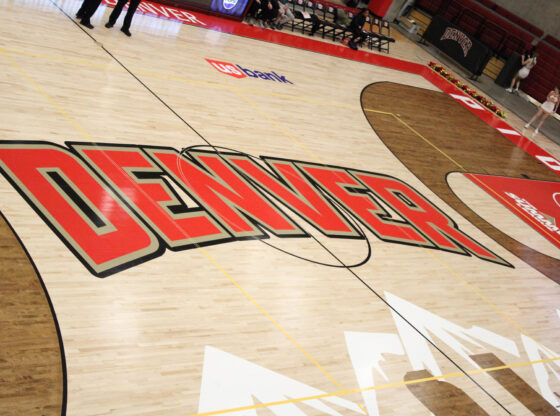This week, as part of our “On The Margins at DU” column that investigates the successes and failures of inclusive excellence at DU, The Clarion spoke with second-years Gabriel Mayer and Max Palay. They serve as the co-presidents of Hillel, which is a “Jewish home-away-from-home for over 1,000 Jewish students at the University of Denver and at Colorado State University in Ft. Collins.” It is an affinity organization that “provides students with a safe place to learn, socialize, celebrate, act, hone their Jewish values, travel to Israel—and develop the all-important skills and contacts to enable them to become tomorrow’s community leaders.”
To get involved with Hillel, follow their social media accounts on Facebook and at @hillelatdu on Instagram. When campus is open, visit their facility south of campus, or attend Shabbat dinners most Fridays starting at 6 p.m. For now, you can attend their Shabbat service with CSU, CC and CU on Zoom this Friday, April 24. Details can be found on their social media pages.
Minor edits have been made for the sake of clarity.
Isaiah: What is Hillel? What role does your presence serve on campus?
Gabriel: It is a cultural group for Jewish life on campus. It is a place where we host events relating to the Jewish calendar, ranging from our larger events like Passover and the High Holidays to weekly Shabbats. It is an opportunity for Jewish students on campus to have a home and a place to meet other Jews and others as well. Anybody is welcome.
Isaiah: In general, do you feel like DU is inclusive of the Jewish community? What has been your personal experience?
Gabriel: I do not think DU as a school has done anything negative or inherently distasteful towards the Jewish community. But we have had some problems with representation in the past such as the first day of school being on High Holidays.
This year, in the music school, our first major orchestral concert of the year had a guest conductor from the Colorado Symphony Orchestra, Brett Mitchell. But it was on Kol Nidre, which is the holiest day of the year for Judaism.
There are ways the school could improve. They could acknowledge issues that Jewish students face on campus. At the same time, I feel like DU overall has been great for me as a Jew.
Max: Personally, I keep kosher. There are definitely days where I will go to the dining halls, and I will not have anything that I can just go in and grab. Overall, DU is one of the better places to be a Jewish student though.
Isaiah: In what ways has DU succeeded in taking this community into consideration in the past?
Gabriel: The support of Hillel, Chabad and Jewish organizations on campus is huge. I think making sure we get representation, sharing events, acknowledging Holocaust Remembrance Day and things like that are important.
Max: After the Tree of Life shooting last year, there was an email that went out pretty rapidly from DU. It said that DU supported the Jewish community. It is small things like that that help during difficult times for the Jewish community.
Isaiah: In what ways has DU failed, and continue to fail, in taking this community into consideration?
Gabriel: Some of the scheduling problems, that is a major one. It is tough for the first day of your first year of college to be on a day that is supposed to be one of the holiest of your religion. To have to pick between school and religion is unfair.
Max: The Jewish calendar is planned out for eternity. It is not like it just popped up.
Isaiah: Do you feel like DU is supportive of your programing?
Gabriel: In a lot of ways, DU organizations like the Office of Sustainability have been helpful. But, the school as a whole is not advertising our events.
Max: When we do get money from the school, we are competing for the very small amount of money that they give towards all these affinity groups. They could definitely do better in supporting us.
Gabriel: We are not sitting here saying DU has been horrible to us, but we are saying DU could do better. DU could make progress.
Isaiah: Why is it important to have organizations like Hillel present on campus?
Max: When you go into your first year of college, often you do not know anyone and you might be coming from out-of-state. It is great to have a community like Hillel to fall back on. One of the first things I did during O-week was go to a Hillel event, and I met two of the people who are now my roommates. It is great to know that if I need to, I can always come to Hillel and have a great community.
Gabriel: For a lot of us, we grew up going to lots of services, attending summer camps—I went to a Jewish day school for high school. For a lot of people, having a center for Jewish life, an opportunity to meet other Jews and continue celebrating the rich tradition of Judaism, is really important.
It is also an opportunity for people to get involved who have not quite found their passion for Judaism or religion yet. It is absolutely necessary that we have affinity groups and organizations like this on campus.
Isaiah: Do you feel like having the physical Hillel space helps with creating community?
Gabriel: Yeah, definitely. We are very lucky. We have a beautiful building. We could not be more thankful for our facility. Having this space creates a good opportunity to bring people together. We have all sorts of spaces for people to gather around, meet and host events. I think that affinity groups on campus should all have a space like this.
Max: There is also the bonus that when you are feeling sick or homesick, when you want that old Jewish food your mom cooked, we have a kitchen and we can help comfort you.
Gabriel: When I was out sick—Noam, our campus director—brought me some matzah ball soup. Little things like that, that make you feel cared about, are so important.
Isaiah: What do you hope to see in DU’s future in terms of inclusive excellence with the Jewish community?
Gabriel: More acknowledgment of substantial Jewish holidays and events would be really beneficial to the Jewish students on campus. If they speak out about events that are happening, it will diversify the campus and bring more people here. They should do that for all affinity groups, not just Hillel. There are events we host that a lot of people could be interested in. But the school does not always advertise it or publicize it, so a lot of people miss out.
Isaiah: What are some of the smaller week-to-week events that Hillel puts on?
Max: Nearly every Friday, we will have some sort of Shabbat service or snack.
Gabriel: We do different types of Shabbats. We are also starting to integrate events that are not just Shabbat-oriented, like an Avalanche game or a snowshoeing trip.
A big goal of ours in the future is collaboration with other affinity groups and different groups on campus. We have already begun to do this. We did a multicultural Shabbat, which was a huge success. We are also planning on doing a LGBTQ+ Shabbat.
Isaiah: Do you feel that most Jewish students on campus participate in Hillel or at least know about it?
Max: I think most people know about it. Definitely for our big events, like Passover, we have a lot of people show up.
Gabriel: We normally have 100 to 200 people. If people do not know, I hope they see this article. We want you to come. We have the space for you. We want you to be here.
Isaiah: How can people get involved with Hillel and help support the Jewish community?
Max: If your thing is sustainability, we have a great student leadership board and sustainability chair. We have a ton of ways to be involved. We are always looking for people to join.
Gabriel: Reach out to us. We will help you get involved. We will add you to our WhatsApp groups and let you know about events. If you want to join, we will make sure that you have a spot here at Hillel and are welcomed with open arms.











